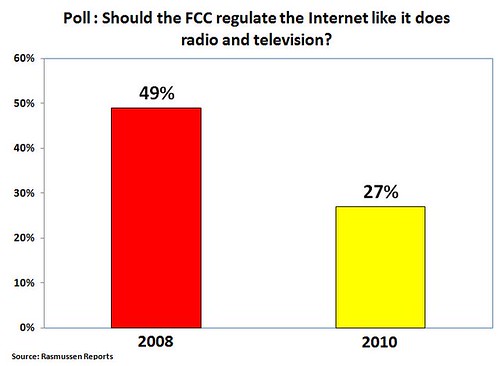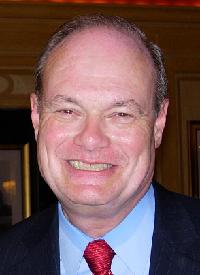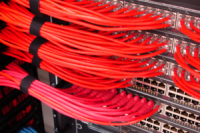 I have a long opinion piece on CNet today, arguing that much of the talk of “reclassifying” or “relabeling” broadband Internet access to bring it under the FCC’s regulatory authority is just that—talk.
I have a long opinion piece on CNet today, arguing that much of the talk of “reclassifying” or “relabeling” broadband Internet access to bring it under the FCC’s regulatory authority is just that—talk.
On April 6th, the D.C. Circuit Court of Appeals ruled definitively that the squishy doctrine of “ancillary jurisdiction” provides no authority for the FCC to impose its net neutrality rules on broadband Internet providers.
Law professors and paid advocates are doing a good job of convincing journalists who don’t understand the finer points of administrative law that all the FCC needs to undo that decision is the will to change the classification of broadband and…problem solved.
Not quite. Those who argue the FCC can simply waive a regulatory wand and give itself all the jurisdiction it needs under Title II of the Communications Act are engaging in serious wishful thinking, or worse.
Continue reading →
My colleague Barbara Esbin, Director of PFF’s Center for Communications and Competition Policy, was recently asked to participate in a conference call to discuss the D.C. Circuit’s recent decision in Comcast v. FCC and its impact on the FCC’s Open Internet (“Net neutrality”) rulemaking proceeding. Yesterday, over at the PFF Blog, she published her working notes and shows exactly what the FCC is up against as it embarks on its radical plan to reclassify the Internet as a crusty old “Title II” common carrier service. Esbin argues:
To impose Title II regulations on the Internet, the FCC would need to establish a rational evidentiary and sound legal basis to bring Internet service providers under its Title II authority through an act of regulatory “reclassification.”
To accomplish this procedurally, the FCC will have to:
- Adopt either a Notice of Inquiry or Notice of Proposed Rule Making proposing that the FCC reverse four of its own prior orders directly on point, one of which has been upheld by the U.S. Supreme Court in NCTA v. Brand X, so that it could declare Internet services to be “telecommunications services.”
- Receive public comment on its proposal creating a record that on balance supports its proposed reclassification.
- Adopt either a Declaratory Ruling or a Report and Order providing a reasoned factual and legal basis for changing the classification and regulatory treatment for Internet services.
Continue reading →
I don’t place a lot of stock in polls… until they confirm what I have long believed, that is! According to this new poll by Rasmussen Reports, 53% of Americans oppose FCC regulation of the Internet. Specifically, in response to the question, “Should the Federal Communications Commission regulate the Internet like it does radio and television?” the breakdown was: 27% =Yes, 53% = No, 19% = Not sure.
But here’s what is more interesting. The 27% of “yes” votes represents a stunning 22-point drop in support for federal regulation of the Internet since a June 2008 poll by Rasmussen, which asked the exact same question. Now, what has changed since 2008 that might have led to such rapidly declining support for Net regulation? Could it have had something to do with the FCC’s ambitious plan to centrally plan broadband markets via its 376-page National Broadband Plan? Or its incessant crusade to impose burdensome Net neutrality regulations, which could decimate investment and innovation?
No, I think what really must be to blame for this sudden public uprising against the FCC was Chairman Julius Genachowski’s alliance with the evil Elmo. People have had enough of the little red demon. That’s my theory and I’m stickin’ to it. I mean, after all, from what my friends on the Left tell me, the American people are just dying to get Net neutrality regulations on the books and have a massive infusion of taxpayer support for Soviet-style broadband plans and media bailouts. So clearly those things just can’t be driving this sudden public skepticism about the FCC, right? It must be Elmo.

Well, you got it! Here’s a essay of mine that The Daily Caller ran today discussing the ramifications of the decision.
___________
Internet freedom got a reprieve Tuesday when the U.S. Court of Appeals for the District of Columbia slapped down a brazen attempt by the Federal Communications Commission (FCC) to ignore the rule of law and begin imposing onerous regulations on broadband network operators. The decision, Comcast v. FCC, deals with arcane matters of regulatory agency jurisdiction, but the stakes were profound and the ramifications for the future of the Internet will reverberate for years to come.
In a nutshell, the FCC argued it had the right to impose so-called “Net neutrality” regulations on a private broadband operator based merely on a handful of principles that the agency had previously said it would not be enforcing as law. Net neutrality regulations would put FCC bureaucrats in the Internet’s driver’s seat and let them determine what was “just and reasonable” of private networks. Critics have rightly feared that Net neutrality sounded all too much a Fairness Doctrine for the Internet since similar language had been used in the broadcast era to justify all sorts of FCC meddling and micromanagement.
Regardless, the FCC’s original position—that its Net neutrality principles were only principles and nothing more—made sense since even a high school civics student can tell you that only Congress can make laws. Moreover, for a brief time, even the FCC seem to realize that laws that would comprehensively regulate such an important sector of the American economy, as Net neutrality rules would, almost certainly require our elected leaders in Congress to reopen and tweak existing statutes like the Telecommunications Act of 1996. After all, Congress had never authorized wide-reaching regulation of the Net or broadband networks, and so, if the agency wanted to extend its regulatory tentacles and wrap them around the Internet it only seems reasonable they get the blessing of lawmakers before doing so. And, for a time, the FCC stuck to a “Hands Off the Net” approach.
Continue reading →
John Schwartz of The New York Times called me two weeks ago and asked for comment about a potential controversy involving mobile phone provider Sprint and the charitable organization Catholic Relief Services (CRS). The facts were pretty sketchy at the time, but Schwartz told me that CRS was accusing Sprint of blocking Mobile Commons, the company that connects CRS and 100 other nonprofit organizations with text messaging networks, from getting a short code to create a charitable mobile donation program in the wake of the Haiti earthquake. Here’s the basic background that appeared in Schwartz’s March 24th article, “Catholic Charity and Sprint Tangle Over Texting“:
[CRS] wanted to try a twist on the technology: when people sent a text message to donate, they got a reply offering to connect them via phone to the charity’s call center. The group hoped that the calls could build a stronger bond with donors, and garner larger contributions as well. But just three days into the effort after the Jan. 12 earthquake, the charity got word that Sprint Nextel was demanding that the “text-to-call” effort be shut down. The charity had 40 days to abandon the feature or lose access to millions of Sprint customers. Sprint’s original motivations are murky; it said that an intermediary company had failed to properly fill out a form to verify that it was dealing with a legitimate charity.
It didn’t take long for the regulatory activists at Free Press and Public Knowledge to pounce and claim the Federal Communications Commission (FCC) had to intervene to save our souls from the nefarious scum at Sprint. After all, you do know that Sprint hates Haitians, right? The company obviously wanted to see Haitians starve and not receive any support from charitable organizations.
No, seriously, come on! How asinine is this storyline?! Continue reading →
 Noting that the Telecom Act has become ” irrelevant to the ecosystem that has developed,” Verizon’s Executive Vice President Tom Tauke today called for Congress to overhaul the nation’s archaic communications laws and the regulatory regime that the Federal Communications Commission (FCC) is currently attempting to pigeonhole the Internet and entire Digital Economy into. It’s an excellent speech, and I encourage you to read the entire thing (which I have embedded down below the fold in a Scribd reader).
Noting that the Telecom Act has become ” irrelevant to the ecosystem that has developed,” Verizon’s Executive Vice President Tom Tauke today called for Congress to overhaul the nation’s archaic communications laws and the regulatory regime that the Federal Communications Commission (FCC) is currently attempting to pigeonhole the Internet and entire Digital Economy into. It’s an excellent speech, and I encourage you to read the entire thing (which I have embedded down below the fold in a Scribd reader).
“[T]he test for government intervention in the marketplace is to prevent either harm to users or anti-competitive activity,” he said. He rightly noted that, in an age of technological convergence and vigorous cross-platform competition, the old silo-based approach of the Telecom Act — with its various Titles for outmoded market definitions — no longer makes any sense. He noted:
by the very nature of the Internet Ecosystem, many are working together or competing in other company’s turf. Computer companies sell phones, and quite successfully. Search engines sell open operating systems. Network providers create their own apps stores. That means that the value proposition to the consumer is really a package created by many companies acting together with little, if any, regard to their previous corporate histories. So no set of companies should be immune from scrutiny.
Of course, a regulatory regime already exists that accomplishes this goal: antitrust law. But Tauke’s proposal isn’t quite that sweeping. He doesn’t call for the FCC to be dynamited the ground and to just shift everything into the antitrust bucket, which some of us would prefer. Instead, he speaks generically about the need for a more sensible process — most likely still enforced by the FCC — that would work as follows:
Continue reading →
 I published an opinion piece today for CNET arguing against recent calls to reclassify broadband Internet as a “telecommunications service” under Title II of the Communications Act.
I published an opinion piece today for CNET arguing against recent calls to reclassify broadband Internet as a “telecommunications service” under Title II of the Communications Act.
The push to do so comes as supporters of the FCC’s proposed Net Neutrality rules fear that the agency’s authority to adopt them under its so-called “ancillary jurisdiction” won’t fly in the courts. In January, the U.S. Court of Appeals for the D.C. Circuit heard arguments in Comcast’s appeal of sanctions levied against the cable company for violations of the neutrality principles (not yet adopted under a formal rulemaking). The three-judge panel expressed considerable doubt about the FCC’s jurisdiction in issuing the sanctions during oral arguments. Only the published opinion (forthcoming) will matter, of course, but anxiety is growing.
Solving the Net Neutrality jurisdiction problem with a return to Title II regulation is a staggeringly bad idea, and a counter-productive one at that. My article describes the parallel developments in “telecommunications services” and the largely unregulated “information services” (aka Title I) since the 1996 Communications Act, making the point that life for consumers has been far more exciting—and has generated far more wealth–under the latter than the former.
Under Title I, in short, we’ve had the Internet revolution. Under Title II, we’ve had the decline and fall of basic wireline phone service, boom and bust in the arbitraging competitive local exchange market, massive fraud in the bloated e-Rate program, and the continued corruption of local licensing authorities holding applications hostage for legal and illegal bribes.
Continue reading →
Should ISPs be barred under net neutrality from discriminating against illegal content? Not according to the FCC’s draft net neutrality rule, which defines efforts by ISPs to curb the “transfer of unlawful content” as reasonable network management. This exemption is meant to ensure providers have the freedom to filter or block unlawful content like malicious traffic, obscene files, and copyright-infringing data.
EFF and Public Knowledge (PK), both strong advocates of net neutrality, are not happy about the copyright infringement exemption. The groups have urged the FCC to reconsider what they describe as the “copyright loophole,” arguing that copyright filters amount to “poorly designed fishing nets.”
EFF’s and PK’s concerns about copyright filtering aren’t unreasonable. While filtering technology has come a long way over the last few years, it remains a fairly crude instrument for curbing piracy and suffers from false positives. That’s because it’s remarkably difficult to accurately distinguish between unauthorized copyrighted works and similar non-infringing files. And because filters generally flag unauthorized copies on an automated basis without human intervention, even when filters get it right, they often disrupt legal, non-infringing uses of copyrighted material like fair use.
Despite copyright filtering technology’s imperfections, however, outlawing it is the wrong approach. At its core, ISP copyright filtering represents a purely private, voluntary method of dealing with the great intellectual property challenge. This is exactly the sort of approach advocates of limited government should embrace. As Adam and Wayne argued back in 2001:
To lessen the reliance on traditional copyright protections, policymakers should ensure that government regulations don’t stand in the way of private efforts to protect intellectual property.
Continue reading →
The way Ben Kunz puts it in a new Business Week article, “Each device contains its own widening universe of services and applications, many delivered via the Internet. They are designed to keep you wedded to a particular company’s ecosystem and set of products.”
I like Ben’s article a lot because it recognizes that “ walling off” and a “widening universe” are not mutually exclusive. If only policymakers and regulators acknowledged that. They must know it, but admitting it means acknowledging their limited relevance to consumer well-being and a need to step aside. So they feign ignorance.
walling off” and a “widening universe” are not mutually exclusive. If only policymakers and regulators acknowledged that. They must know it, but admitting it means acknowledging their limited relevance to consumer well-being and a need to step aside. So they feign ignorance.
Many claim to worry about the rise of proprietary services (I, as you can probably tell, often doubt their sincerity) but I’ve always regarded a “Splinternet” as a good thing that means more, not less, communications wealth. I first wrote about this in Forbes in 2000 when everyone was fighting over spam, privacy, content regulation, porn and marketing to kids.
Increasing wealth means a copy-and-paste world for content across networks, and it means businesses will benefit from presence across many of tomorrow’s networks, generating more value for future generations of consumers and investors. We won’t likely talk of an “Internet” with a capital-“I” and a reverent tremble the way we do now, because what matters is not the Internet as it happens to look right now, but underlying Internet technology that can just as easily erupt everywhere else, too.
Meanwhile, new application, device and content competition within and across networks disciplines the market process and “regulates” things far better than the FCC can. Yet the FCC’s very function is to administer or artificially direct proprietary business models, which it must continue to attempt to do (and as it pleads for assistance in doing in the net neutrality rulemaking) if it is going to remain relevant. I described the urgency of stopping the agency’s campaign recently in “Splinternets and cyberspaces vs. net neutrality,” and also in the January 2010 comments to the FCC on net neutrality.
Continue reading →
by Adam Thierer & Berin Szoka
 We’re hoping that the Government Accountability Office (GAO) has made some sort of mistake, because it’s hard to believe its latest findings about the paperwork burden generated by Federal Communications Commission (FCC) regulatory activity. In late January, the GAO released a report on “Information Collection and Management at the Federal Communications Commission” (GAO-10-249), which examined information collection, management, and reporting practices at the FCC. The GAO noted that the FCC gathers information through 413 collection instruments, which include things like: (1) required company filings, such as the ownership of television stations; (2) applications for FCC licenses; (3) consumer complaints; (4) company financial and accounting performance; and (5) a variety of other issues, such as an annual survey of cable operators. (Note: This does not include filings and responses done pursuant to other FCC NOIs or NPRMs.)
We’re hoping that the Government Accountability Office (GAO) has made some sort of mistake, because it’s hard to believe its latest findings about the paperwork burden generated by Federal Communications Commission (FCC) regulatory activity. In late January, the GAO released a report on “Information Collection and Management at the Federal Communications Commission” (GAO-10-249), which examined information collection, management, and reporting practices at the FCC. The GAO noted that the FCC gathers information through 413 collection instruments, which include things like: (1) required company filings, such as the ownership of television stations; (2) applications for FCC licenses; (3) consumer complaints; (4) company financial and accounting performance; and (5) a variety of other issues, such as an annual survey of cable operators. (Note: This does not include filings and responses done pursuant to other FCC NOIs or NPRMs.)
Regardless, the FCC told the GAO that it receives nearly 385 million responses with an estimated 57 million burden hours associated with the 413 collection instruments. A “burden hour” is defined under the Paperwork Reduction Act as “the time, effort, or financial resources expended by persons to generate, maintain, or provide information to a federal agency.” And the FCC is generating 57 million of ‘em! Even though we are frequently critical of the agency, these numbers are still hard to fathom. Perhaps the GAO has made some sort of mistake here. But here’s what really concerns us if they haven’t made a mistake. Continue reading →
 I have a long opinion piece on CNet today, arguing that much of the talk of “reclassifying” or “relabeling” broadband Internet access to bring it under the FCC’s regulatory authority is just that—talk.
I have a long opinion piece on CNet today, arguing that much of the talk of “reclassifying” or “relabeling” broadband Internet access to bring it under the FCC’s regulatory authority is just that—talk.




 We’re hoping that the Government Accountability Office (GAO) has made some sort of mistake, because it’s hard to believe its latest findings about the paperwork burden generated by Federal Communications Commission (FCC) regulatory activity. In late January, the GAO released a report on “
We’re hoping that the Government Accountability Office (GAO) has made some sort of mistake, because it’s hard to believe its latest findings about the paperwork burden generated by Federal Communications Commission (FCC) regulatory activity. In late January, the GAO released a report on “ The Technology Liberation Front is the tech policy blog dedicated to keeping politicians' hands off the 'net and everything else related to technology.
The Technology Liberation Front is the tech policy blog dedicated to keeping politicians' hands off the 'net and everything else related to technology.